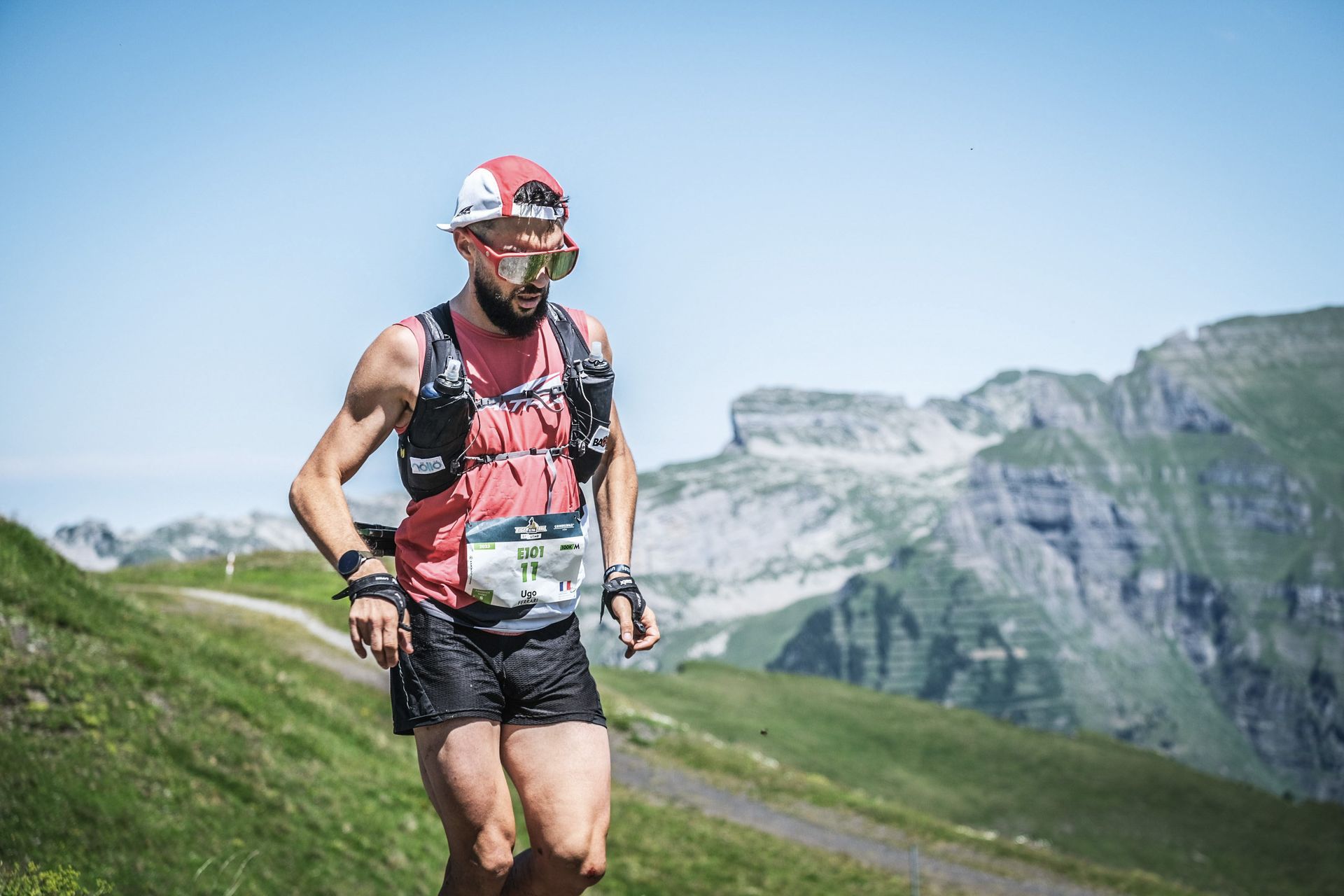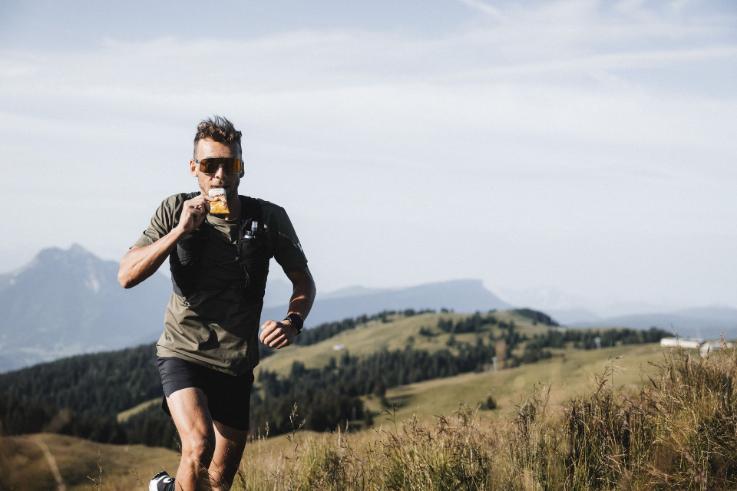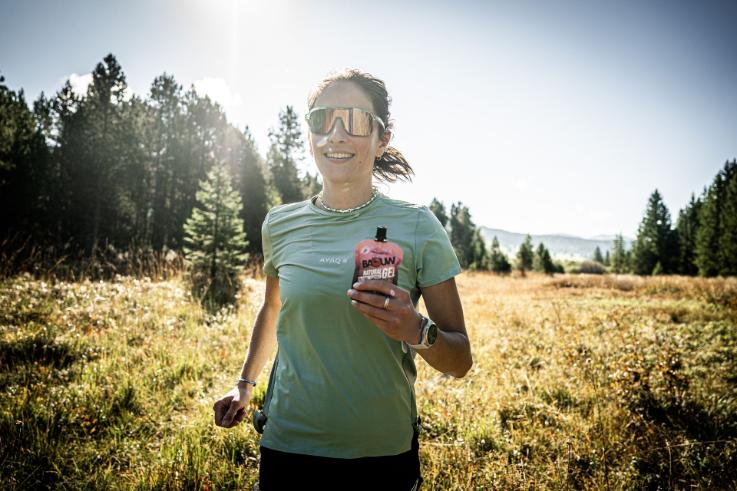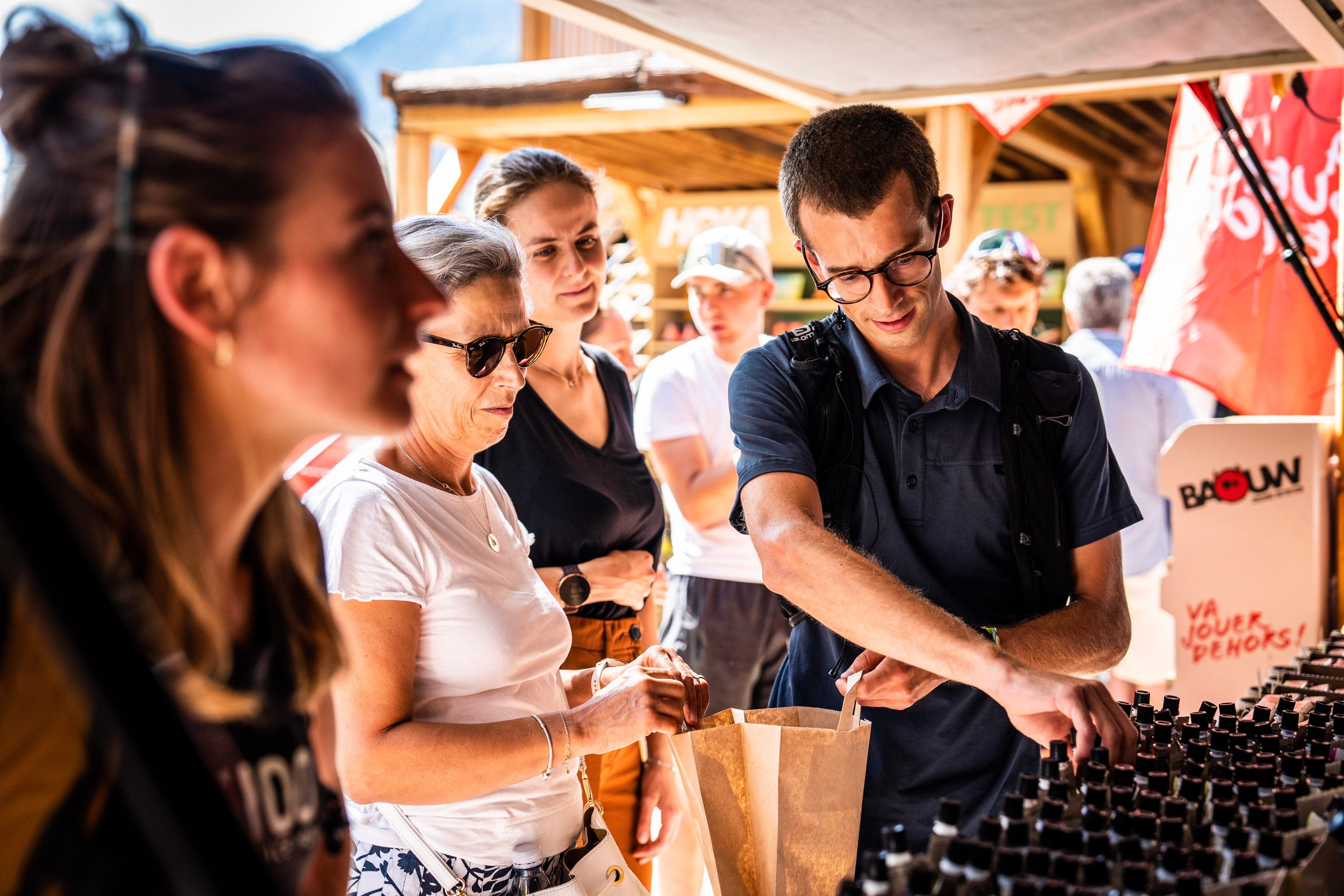The ideal diet for trail running is a vast subject that requires close attention to many factors: the body's assimilation of nutrients, management of energy reserve, close relationship sleep and sport performance, principle of digestion... In short, you need to take an interest in sports nutrition as a whole to understand how to eat well before such physical exertion, during which your body is put under severe strain..
Not sure what to eat for your trail runs and running sessions? Want to optimize your performance and enjoy yourself as much as possible? Our expert nutritionists, Benoît Nave and Jodie Penetro, answer all your questions in this article.
Contents
- Anticipate: from physical and nutritional preparation to testing your diet for your trail run
- Planning: Drawing up a food plan, knowing what foods are available at feed stations.
- Listening to yourself: the importance of listening to your body and testing your nutrition during training
- What should you eat during a trail run of less than 30 km? Our tips for a 4-hour effort
- The ideal nutrition for a 30 km to 50 km trail run, i.e. between 4 and 8 hours of exercise
- Nutrition for a 50-80 km trail run: our recommendations for 8 to 12 hours of exercise
- What nutrition is needed for a trail run between 80 km and 120 km, i.e., between 12 and 18 hours of effort?
- 15 nutrition tips to help you succeed in trail running, by Benoît Nave
Anticipate: from physical and nutritional preparation to testing your diet for your trail run
That's it, you've clicked on “register,” you've got your race number, the race is in two or three months, and you think to yourself, “I've got time to train, get in shape, I can do this!”
Indeed, good physical preparation is important. To achieve this, a specific training plan combined with a healthy lifestyle is an excellent starting point, but that's not all. You will also need to test your equipment in advance, as well as your nutrition during exercise. In trail running, nutrition is essential for managing your effort and achieving your goals.
Testing your sports nutrition during exercise means practising drinking and eating enough during your preparation sessions. That way, you'll know what's good for you, what you digest best and what tastes you prefer to consume during exercise. To do this, we advise you to try different recipes, with different tastes, and above all to test them under race conditions. In other words, over a fairly difficult section, trying to run or walk at the same time.
The same goes for your pre- and post-trail diet. You need to be prepared during the week leading up to your race, which means knowing what you can eat before, during, and after your run. This will help you avoid digestive problems at the moment of truth and optimize your recovery so you can hit the ground running again. And on that note, keep in mind that sweet potate for athlete endurance form a very good duo, which explains its presence in our energy puree sweet potatoe/carrot/ Timut pepper !
Plan: define a trail nutrition plan and know what foods are available at aid stations.
Avant de partir, vous devez savoir exactement ce que vous allez manger/boire pendant votre course. Vous devez avoir une idée aussi précise que possible de la fréquence à laquelle vous allez manger. Avec un plan précis, vous n'aurez qu'à l'ajuster légèrement en fonction de votre état physique et des aléas de la course. Mais au moins, vous saurez exactement où vous en êtes par rapport à ce qui était prévu initialement.
It is also important to know what you can put in your trail bag and what you need to plan for at the aid stations (and your support team if you have one). During the race, aid stations are often seen as lifesavers! So find out which ones will be available, how far apart they are, your estimated arrival times, etc.
It is VERY important to have a nutrition plan in mind before your trail run. This plan is designed to help you know what to eat during your race and avoid any unpleasant surprises. For example, "I drink every 15 minutes and eat every 20 minutes. If I'm struggling, I'll have some fruit compote or a energy gel. If I'm feeling good, I try to take a protein bar or energy to chew."
Finally, when purchasing your nutrition pack, keep in mind that it is always better to have too much than not enough. To help you plan your trail running nutrition, take into account the elevation gain and distance... and draw on your experience!

Listening to yourself: the importance of listening to your body and testing your nutrition during training
The success of your trail run also depends above all on your ability to listen to your body and the signals it sends you. The basic rule is to drink at least when you are thirsty and eat as soon as you feel hungry.
While it may seem obvious, never underestimate your body and brain's ability to send you the signals you need to recharge your energy levels sufficiently for exercise. This allows you to anticipate your needs as much as possible and avoid finding yourself in a situation of dehydration or hypoglycemia.
And to make things easier for you, we've put together some small nutrition packs tailored to your races, which you can find below!
What should you eat during a trail run of less than 30 km? Our tips for a 4-hour effort
This distance is a little unusual because, in big quotation marks, it is relatively “short,” at least for an endurance effort! Also, you will only need a few nutrition products. So there's no need to prepare anything too complicated: we simply recommend choosing a few Baouw available on our website. You can try out different flavors and recipes with our gift boxes, which include several of our community's favorite recipes.
Keep in mind that the shorter the trail, the more intense your run is likely to be. Our natural gels will help you maintain optimal carbohydrate levels while protecting your stomach thanks to their natural ingredients. They are much easier to digest on short trails where your heart rate will be higher and your ability to chew/salivate reduced.
The ideal pace? One gel every 30 minutes after 50 minutes of exercise, for example.
The ideal nutrition for a 30 km to 50 km trail run, i.e. between 4 and 8 hours of exercise
We have designed a mix comprising:
- 5 purees,
- 5 bars,
- 3 natural energy gels to consume throughout your race at a rate of 1 bar every 45 minutes of effort and 1 puree or gel every 30 minutes.
It consists of both fruity and savory recipes to allow you to vary your tastes and compensate for the minerals lost through perspiration. In addition to this diet, we recommend that you stay hydrated throughout your workout, drinking an average of 600 ml per hour of exercise. Of course, you should adjust this according to how you feel, the weather conditions, and how much you sweat. Don't forget the importance of hydratation in sport !
In this meal plan, we assume that you will also eat at the refreshment stations provided by the organization or through assistance.

Nutrition for a 50 km to 80 km trail run: our recommendations for 8 to 12 hours of exercise
With nutrition for a 50 km to 80 km trail run in mind, we have developed a special blend containing:
- 13 purees,
- 7 bars,
- 3 natural energy gels to consume throughout your race at a rate of 1 bar every 45 minutes of effort and 1 puree or gel every 30 minutes.
Here again, it meets your needs as an endurance athlete engaging in particularly intense physical activity. In terms of hydration, the average 600 ml per hour of exercise recommended above also applies.
Note that on long races of this type, you may prefer purées towards the middle of the trail, when chewing becomes increasingly difficult. You can then switch to gels to recharge your batteries for the final stages. Finally, you may also find comfort in our savory purées, which are particularly popular for this type of effort.
My ideal trail mix !
What nutrition is needed for a trail run between 80 km and 120 km, i.e., between 12 and 18 hours of effort?
Our “80 km to 120 km trail running nutrition mix” includes:
- 20 purees,
- 10 bars,
- 3 natural energy gels to consume throughout your race at a rate of 1 bar every 45 minutes of effort and 1 puree or gel every 30 minutes.
Whether it's alternating between purees, bars, and gels or staying hydrated, our recommendations are the same as for the previous trail, again to be adapted.
This way my trail pack !

15 nutrition tips to help you succeed in trail running, by Benoît Nave
In trail running, nutrition is one of the keys to enjoying yourself and achieving your goals. Benoît Nave, one of the most renowned experts in sports nutrition and coach to numerous champions, including Xavier Thévenard, three-time winner of the UTMB, shares 15 rare and specific tips that you won't hear anywhere else, so consume them without moderation! If you want to be sure of success in your next trail or ultra-trail, read on!
Trail nutrition tip #1: “Consider trail running as an excuse for good nutrition.”
"It's well known: happiness isn't found at the summit, but on the path that leads there! The same goes for trail running. Happiness isn't just about winning the competition, but rather about completing a full race, enjoying yourself as much as possible, and achieving your goals on the big day. However, this feeling of fulfillment cannot be achieved without proper nutrition. My recommendation is therefore to make your desire to enjoy trail running one of the answers to the question “why eat better?”"
Trail nutrition tip #2: “Focus on healthy eating rather than competitive eating.”
Before striving for those last few percentage points of performance—the famous marginal gains that enable champions to raise their arms at the finish line—I recommend that trail runners ensure they have already mastered the fundamentals. By that I mean a healthy daily diet consisting of raw, unprocessed, organic, and seasonal foods. A diet that keeps you healthy, even before you start eating for competition, is already a guarantee of enjoyment and performance in trail running."
Trail nutrition tip #3: “When trail running, the key organ is the intestine.”
"In trail running, as in most sports, we tend to focus on our heart, muscles, and head... often neglecting the key organ: the intestine! Its role is crucial. It is the main area of exchange with the outside world. Everything passes through the gut. Therefore, the proper functioning of this organ determines the optimal activity of all the others. But how can we take care of it? Through the healthy diet mentioned above, which protects against inflammation of the gut, which causes fatigue, digestive problems, and other injuries."
Trail nutrition tip #4: “Adopt the principles of chrononutrition”
"To make it easy chrononutrition consists of giving the body what it needs, at the right time. It is therefore a question of timing, particularly to promote the secretion of the four neurotransmitters that form the pillars of an individual's behavior. In this context, one rule of chrononutrition seems absolutely fundamental to me: consume as much protein as possible in the morning, rather than carbohydrates. This is why I recommend a savory breakfast, with eggs, ham, sardines, or plant-based proteins, rather than the breakfast we are accustomed to in French culture, based on cereals and toast.
Trail nutrition tip #5: “Depending on the type of trail run, adjust the timing of the meal that follows.”
Chrononutrition is based on the concept of metabolic windows, particularly the important one that follows a workout. Respecting this window will ensure good assimilation and optimal recovery from the session, with the aim of building lasting progress over time. In trail running, after an intense session, I recommend replenishing glycogen stores fairly quickly by eating carbohydrates such as rice, quinoa, or sweet potatoes within an hour. On the other hand, if you are preparing for an ultra-trail, with long, gentle endurance runs aimed at developing your lipolysis capabilities, I advise you to delay slightly the moment when you allow your body to replenish its stores, waiting at least 2 hours after the end of your training session before eating.
Trail nutrition tip #6: “When trail running, reducing the risk of digestive problems takes preparation!”
As explained previously, I believe that the gut is the key organ for trail running. In this context, the closer you get to your goal, the more careful you need to be about strengthening it. To do this, I recommend a course of natural probiotics and L-glutamine during the three weeks leading up to the event. Then, five days before the race, I recommend eliminating all hard-fiber fruits and vegetables from your diet in favor of soft-fiber ones. And eat them cooked rather than raw. So opt for apples, pears, peaches, carrots, and zucchini, and temporarily avoid kiwis, leeks, onions, and cabbage. The goal? To avoid the particularly strenuous effort required to digest these hard fibers and thus give your intestines a period of rest. In short, reduce their hyper-impermeability and inflammation to give them the opportunity to function optimally on the big day!
Trail nutrition tip #7: “Before the race, choose from this list of easy-to-digest foods.”
"In addition to the previous advice, I would recommend that trail runners eat foods that are extremely easy to digest before the race. Potatoes, sweet potatoes, quinoa, and buckwheat for carbohydrates, avoiding gluten-containing foods such as pasta. Eggs, fish, and white meat for protein, as well as cooked vegetables and fruit rather than raw!"
Trail nutrition tip #8: “Make sure you have a good carbohydrate intake.”
The closer the deadline gets, the more vigilant you need to be about proper carbohydrate replenishment. This means replenishing your glycogen stores in sufficient quantities, but also within the optimal metabolic window. During your last key training sessions—whether it's your last long run, your last high-intensity session, or your pre-race warm-up—I recommend eating your meal between 30 minutes and 1 hour after taking off your trail running shoes."
Trail nutrition tip #9: “The ideal dinner menu for the night before a race”
"It's difficult to plan a pre-race meal menu, in the sense that I encourage people to adapt it to their individual stress levels. The feeling of butterflies in the stomach varies from runner to runner. For those who can, the ideal meal is a plate of rice with white meat or two eggs, eaten three hours before the start. For others, who have completely lost their appetite or are experiencing minor digestive problems related to anxiety, I recommend eating the same thing, as far as possible, 4 or 5 hours beforehand, and supplementing this with an organic energy bar 30 to 45 minutes before setting off.
Trail nutrition tip #10: “Set up a meal plan for race day.”
All my athletes set a nutrition plan for race day and try to stick to it. It's about creating a framework within which they can adapt or even improvise calmly depending on weather conditions or race events. The advantage of this nutrition plan? You can stay focused on how you feel, in your own bubble, without the mental burden of worrying about what to eat at any given moment, because everything has been defined in advance and all you have to do is apply or adapt it!"
Trail nutrition tip #11: “What is a good trail nutrition plan?”
"A good nutrition plan for trail running is a framework that allows you to maintain an optimal and steady energy level throughout the race. The first rule is to adapt it to the type of effort. For ultra-trail running, I recommend consuming around 35 to 40 grams of carbohydrates per hour, supplemented by an additional portion of fat, starting with our energy bars, as it is easier to chew and digest solids during the first few hours of the race. For shorter races, such as marathons, where the intensity increases, I recommend consuming only carbohydrates, amounting to 50 grams per hour, particularly through our energy compotes or natural energy gels, which are particularly suited to this type of effort."
Trail nutrition tip #12: “Mineral water, the best drink for trail running”
"I'm not a fan of ultra-processed energy drinks, which often prevent the optimal absorption of nutrients provided by bars or compotes and lead to a feeling of nausea after a few hours of running. For me, the best drink for trail running is simply mineral water! Ideally sparkling and packed with minerals such as sodium, it should be consumed in small sips at regular intervals (2 or 3 sips every 10 to 15 minutes). The use of Baouw natural gels is also interesting. These can be diluted in water and their composition, based on natural fruits and agave syrup, is glycémia index low (15) helps prevent the harmful effects of overly sweet drinks.
Trail nutrition tip #13: “Know how to manage hypoglycemia so you can get back on track”
Despite careful preparation and a strictly followed nutrition plan, hypoglycemia is a possibility (the famous glorious uncertainty of sport!). If you experience a sudden drop in energy during a race, don't worry: your trail run isn't ruined! Just like the weather, after the rain comes the sunshine! By managing this hypoglycemia intelligently, it is possible to “come back.” My advice? Recognize this minor crisis, don't panic, slow down for a few minutes, eat an energy bar or natural energy gel, which are useful in this regard for the rapid assimilation of carbohydrates, drink in small sips, then eat a second energy bar a few minutes later... By following this protocol, you will quickly feel better and be able to get back to your cruising speed.
Trail nutrition tip #14: “If you start to feel stomach pain while running, you should...”
“Beyond hypoglycemia, another type of ”crisis" regularly occurs during trail running: stomach ache! Who has never experienced digestive problems during a race? No one! If you feel stomach ache coming on, I recommend eating very small sips of energy compote or tiny bites of energy bars. Do this at fairly regular intervals, keeping what you've just swallowed in your mouth for a few moments so that saliva can help the digestion process."
Trail nutrition tip #15: “Trail nutrition requires avoiding traditional energy gels and favoring natural gels.”
“In line with the previous advice, I strongly recommend avoiding conventional, highly processed energy gels, which are currently very popular among trail runners. It is better to opt for healthy, organic, and natural energy purees and unrefined, natural gels, such as those offered by Baouw!”
A final word from Benoît Nave:
“By following these 15 tips, there's a very good chance that you'll have maximum enjoyment and achieve your goals in your next race!”







